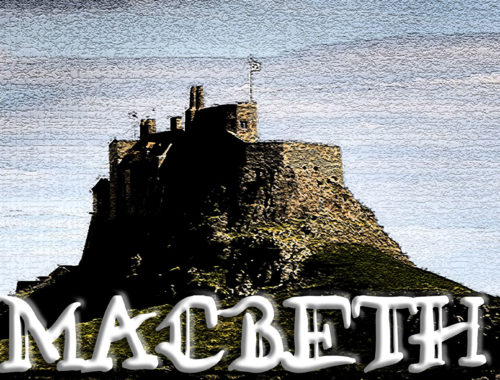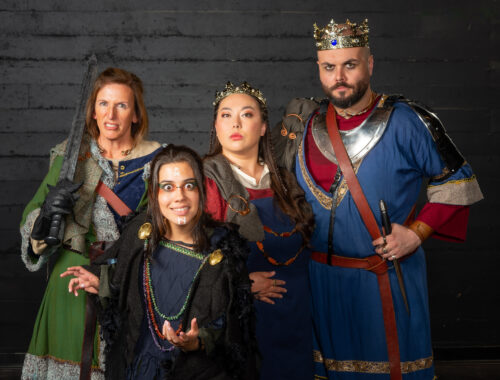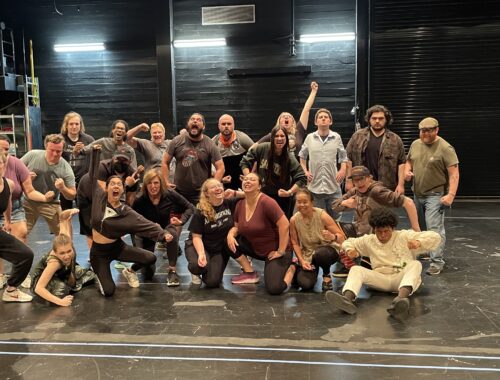Artist Perspective
Meet the Cast of Macbeth – Part 8
Macbeth opens July 7 and runs through July 23. Tickets available.
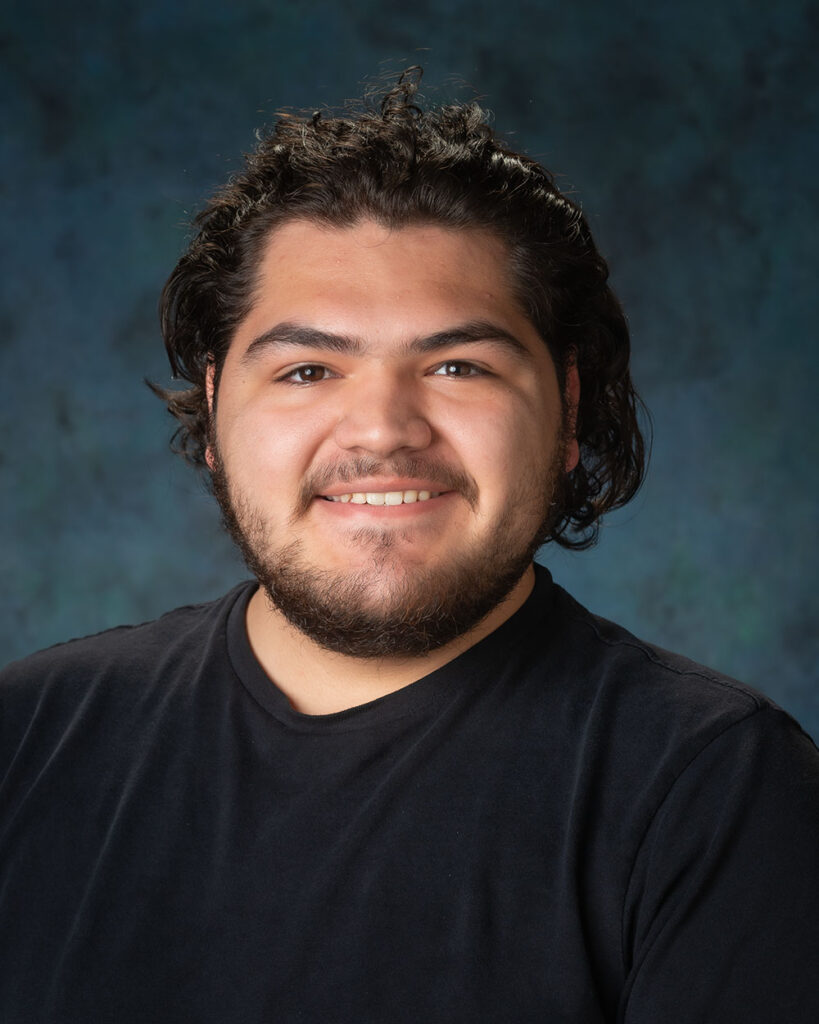
Cuautli Quezada-Gardea (Lennox) This is Cuautli’s first show with SSF and is excited about the opportunity. Cuautli mostly has been performing with Falcons Eye Theater most notably in 𝘔𝘪𝘥𝘴𝘶𝘮𝘮𝘦𝘳 𝘕𝘪𝘨𝘩𝘵’𝘴 𝘋𝘳𝘦𝘢𝘮 where they played Puck and recently 𝘈𝘯𝘵𝘪𝘨𝘰𝘯𝘦 where they were part of the chorus. Cuautli plans to continue studying acting at ARC to work towards becoming a professional actor in the future.
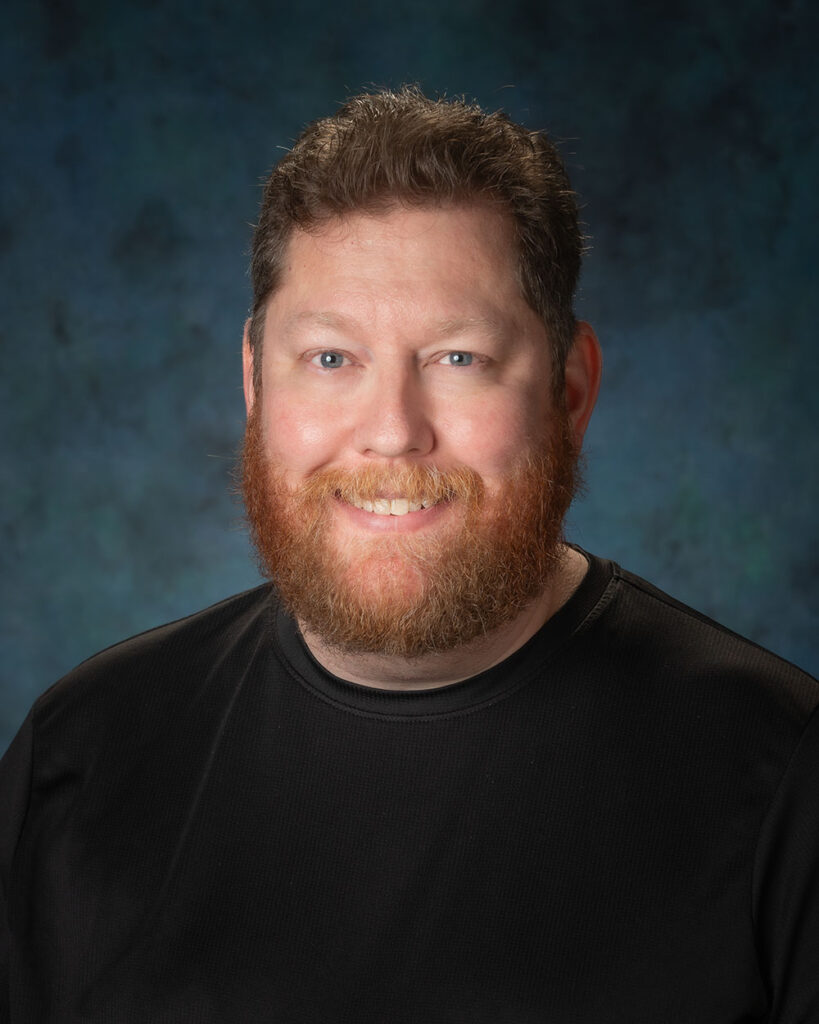
Dennis Redpath (Siward/Duncan’s Servant) Dennis started in theatre taking courses at the University of Hawaii and later the University of Montana. After a long break he returned to performing in his first show with City Theatre, the 2013 production of After Juliet. Since then he has been active with both City Theater and the Sacramento Shakespeare festival productions of Much Ado About Nothing, The Uninvited, Midsummer Night’s Dream, Pride and Prejudice, The Great Gatsby, Henry V, and The Curious Incident of the Dog in the Night-time.
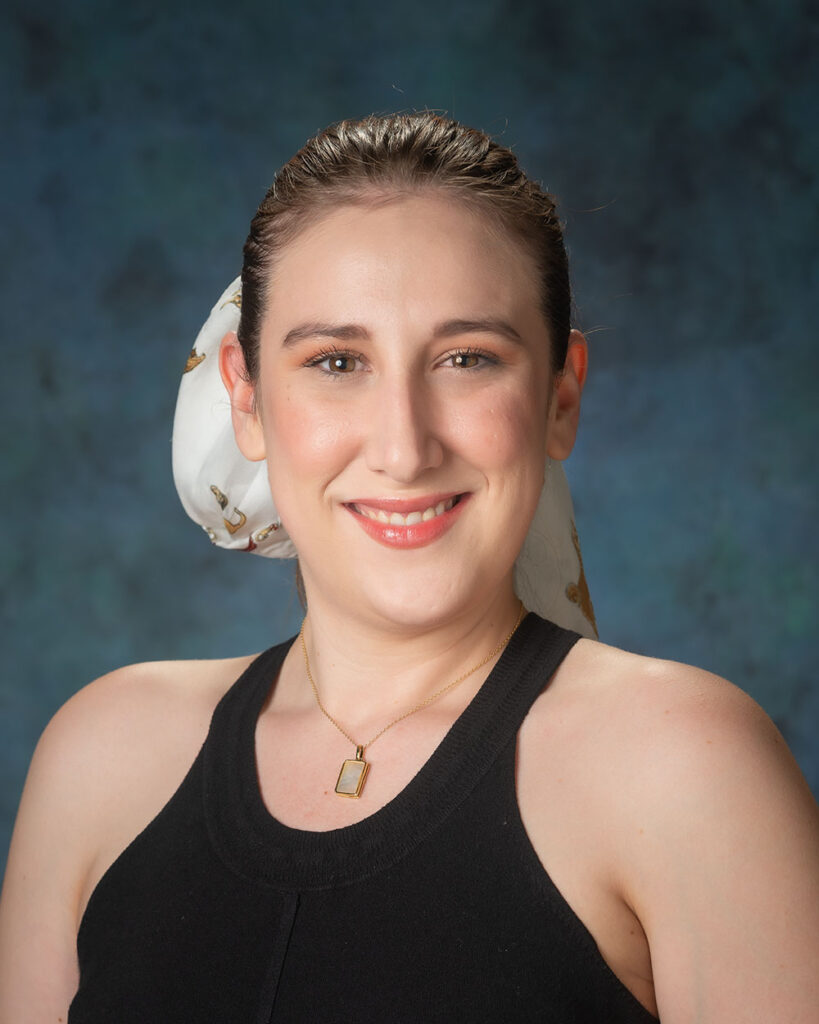
Lauren Graffigna (Witch Team 6/Lady Macduff) Lauren is making her Sacramento Shakespeare Festival debut. She is elated to be back at Sacramento City College where she recently performed as Segismundo in Life is a Dream and Rose Red in Snow White: A British Panto. You may have also seen her at the B Street Theatre in the 24 Hour Play Festival’s Norwegian Death Cleaning. Lauren is grateful to be working with Christine and Luther again and with Lori-Ann for the first time- I appreciate your kindness, vision, and leadership. Lauren would also like to thank the Devised Artist Julianna, the Fight Choreographer Dave, the Costume Designer Nicole and her team, and a resounding thank you to our stage managers Hannah and Erika! Above all, Lauren is thankful to her support system of family, friends, and coworkers who make it possible for her to continue to hone her acting skills and pursue her passion for theater arts.
What is a director?
Macbeth opens July 7 and runs through July 23. Tickets available.
by Christine Nicholson
I love directing. I love being at the helm of the huge collaboration that comes together to create a theatrical production. I love working with others to bring to life the ever-continuing stories of humans – comedies, tragedies, farces, political thrillers, musicals, pantos – all the genres of storytelling that have been developed over the millennia. I love the challenge of bringing into life words that began as thoughts and images in the mind or minds of a person or persons, of working with others (in the case of this year’s Macbeth, over 40 others) to create order out of chaos, and to share that story with others. And what I love about theatre, and what is unique to it, is that it is a shared art form: those who are making the art do not exist without those who witness it in a shared moment in time. This is the essence of storytelling – whether that be ghost stories around a fire, small intimate theatres, big Broadway venues, or 5,000 people watching a huge musical extravaganza at an old Roman Arena.
But I especially love telling Shakespeare’s stories. I am always amazed how words written over four hundred years ago can still capture, beautifully capture, what I think of as the stories of humanity. Yes, he wrote about people from another time, who lived, and thought differently in many ways than we do today. And yes, he was a product of his time, with the blinders that come with it, as they do with all moments in time. But we still wrestle with how to find love and how to keep it strong, how to find and keep a healthy society, and how to harness our desires for power and status. And that is why plays like “Romeo and Juliet,” A Midsummer Night’s Dream,” “Twelfth Night,” Hamlet,” and yes, “Macbeth,” continue to be produced, reimagined, and relevant. And it is absolutely fascinating to me how his plays re-emerge and resonate at different times in history. “Macbeth’s” dive into the heart of the desire for power, and the pull that power has on the human psyche seems to be more profound than ever.
This year, as the theatre continues to recover from near annihilation during the covid pandemic (how can something exist when it is, by definition, a place where humanity gathers and the very act of gathering together was life-threatening), the Shakespeare Festival like many others, facing a budget shortfall, decided to produce only one production, rather than our usual two. We wanted to keep both of our summer directors employed, so we thought it was an excellent opportunity to try co-directing (I had recently performed in a production of Twelfth Night at Big idea Theatre where we had co-directors, Kevin Adamski and Leah Daugherty, whose collaboration showed how two minds can achieve so much more than one). We also decided that as we rebuild our audience, maybe we could create an opportunity to produce in our more intimate performance space, and what better vehicle than “Macbeth.”
Working in the intimacy of a thrust theatre is always a wonderful challenge. When we produced both outside in the park and in the 600-seat proscenium theatre, we had to stage our shows more like a moving painting – Actors need to face the audience for most of the staging, more two-dimensionally. But in a thrust theatre, with the audience on three sides of the stage, it is more like a moving sculpture, three-dimensional. And we need to be able to choreograph the movement so that audiences will see most of the action all the time. If we stage it conventionally, like a painting, like a proscenium production, only those in front of the actors will see the action. It’s much more of a dance. And that’s its appeal to a director. We need to keep the story activated, and with co-directors, we can view the staging from two sides simultaneously and see where we can improve the storytelling with staging.
So, both Lori Ann and I jumped at the opportunity to work together. We’ve worked together for almost twenty years in many capacities, but this was our first opportunity to collaborate as directors. We each bring complementary skills to the table and celebrate each other’s skills. We wanted to find a time where this story could exist, where witches or connections to the supernatural or natural forces were honored, where women could exist as warriors, and where ambition and desire for power could take hold and corrupt. We also wanted to appeal to a large population of actors and audiences. We had more actors audition than we’ve seen in five years. And we have a cast of thirty and a crew of around ten. And hopefully, this production will appeal to a large audience.
We’ve been working for five weeks now. Lori Ann has gathered all of the sound we are using, all of the weapons, worked with our Movement Coordinator with our witches (all 12 of them), our stage managers have been recording everything, staging, prop lists, costume changes, back-stage traffic patterns, while I have worked with our fight choreographer and with staging on a stage with audience on three sides. We put all that together last week, and this week we are adding lights and costumes. Three more rehearsals. Then we add the last piece of the collaboration, the audience. We can’t wait.
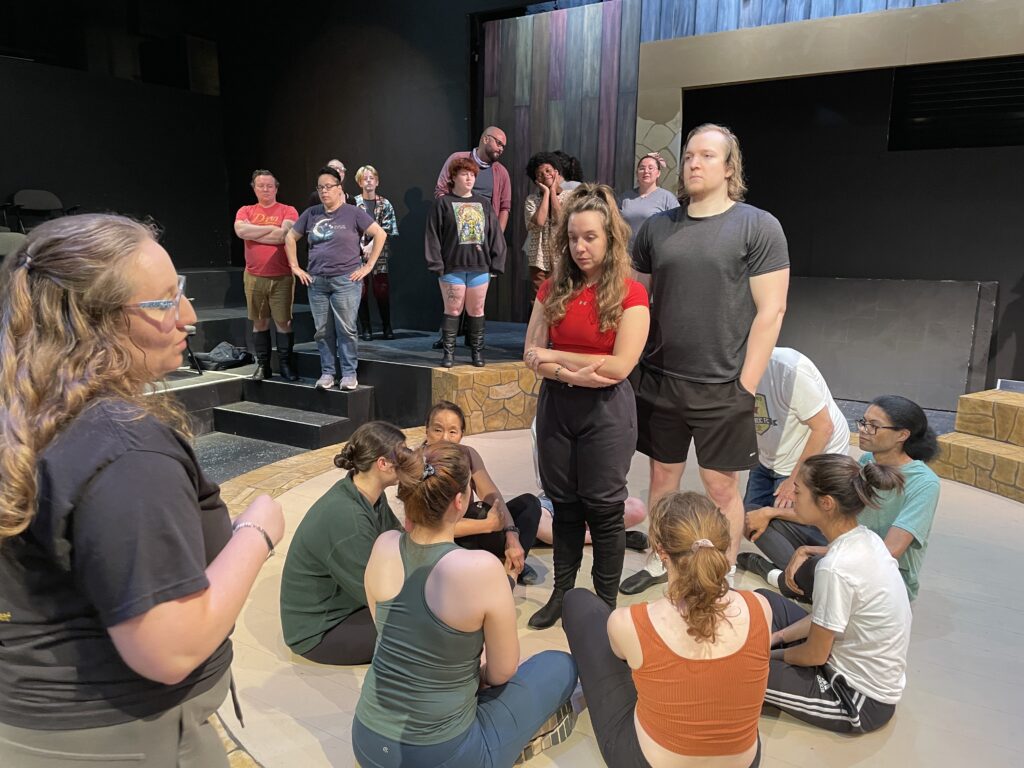
Working with Julianna Camille 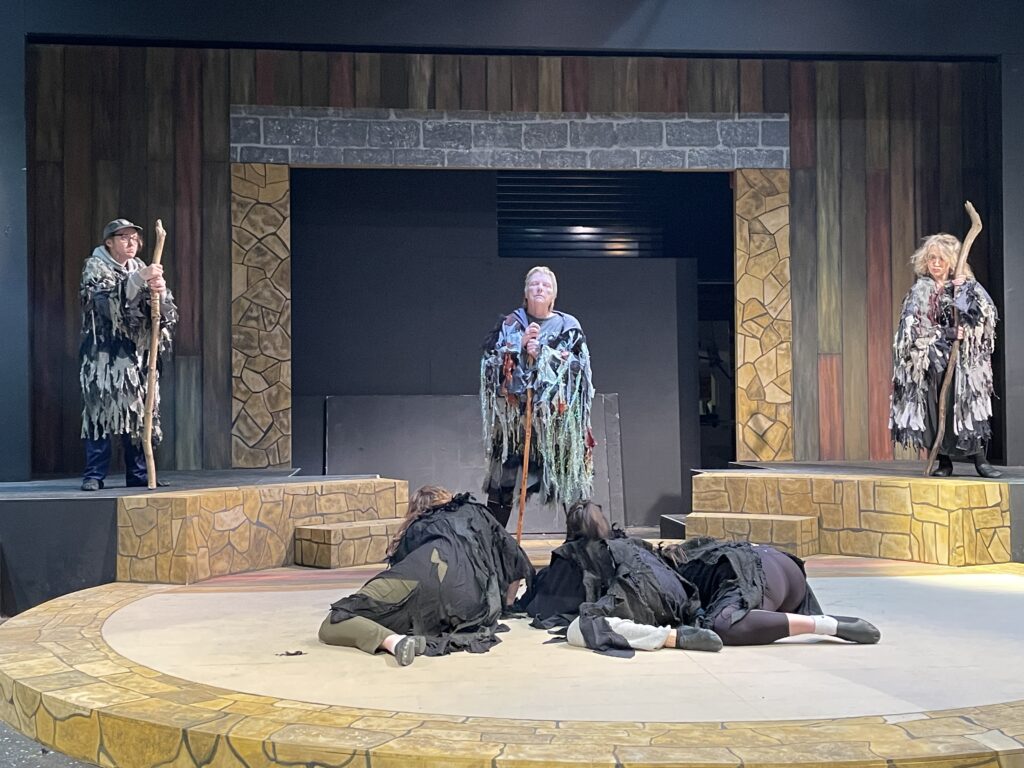
Hecate and her witches 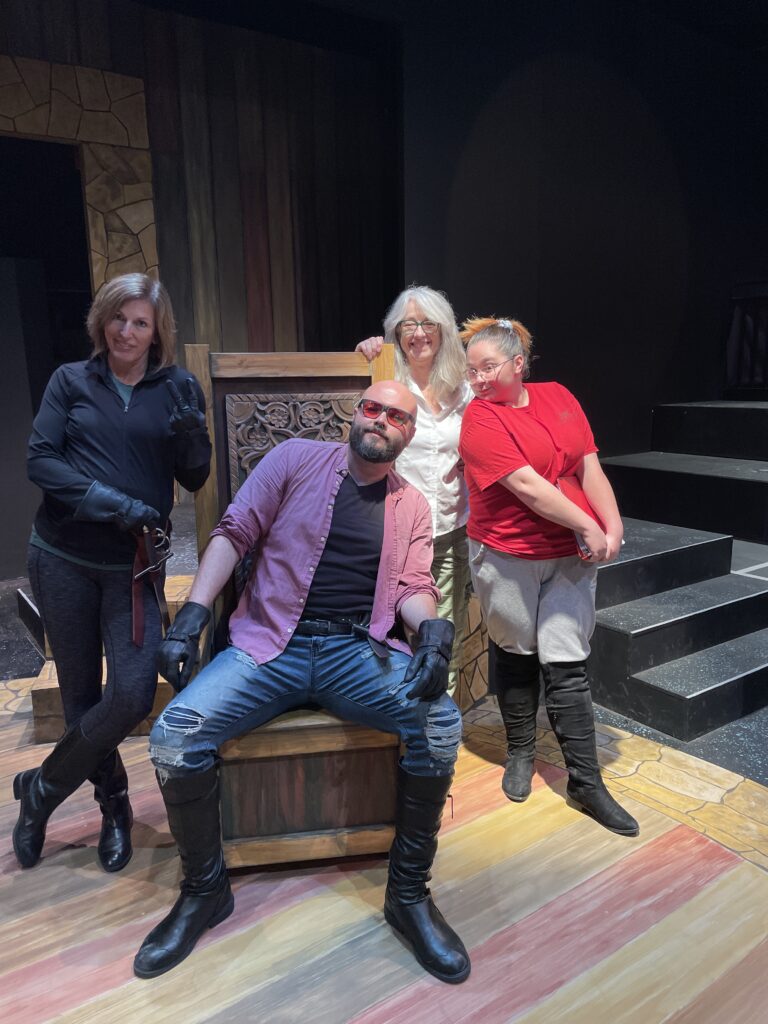
Kathleen Poe, Brandon Lancaster, Christine Nicholson & Petra Tafoya 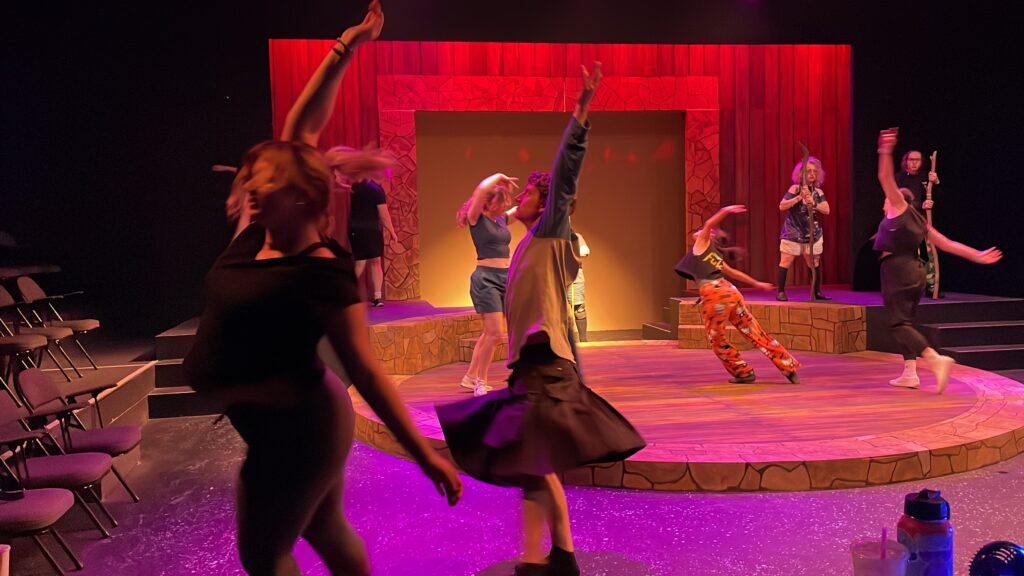
Witches making magic 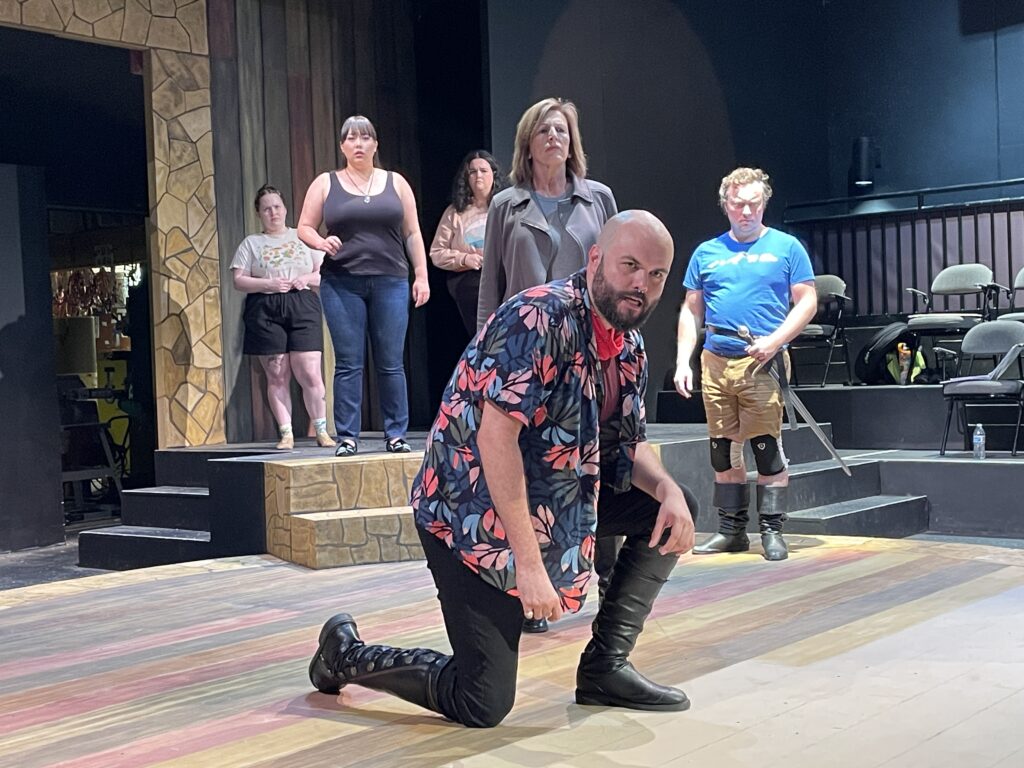
Cast of Macbeth 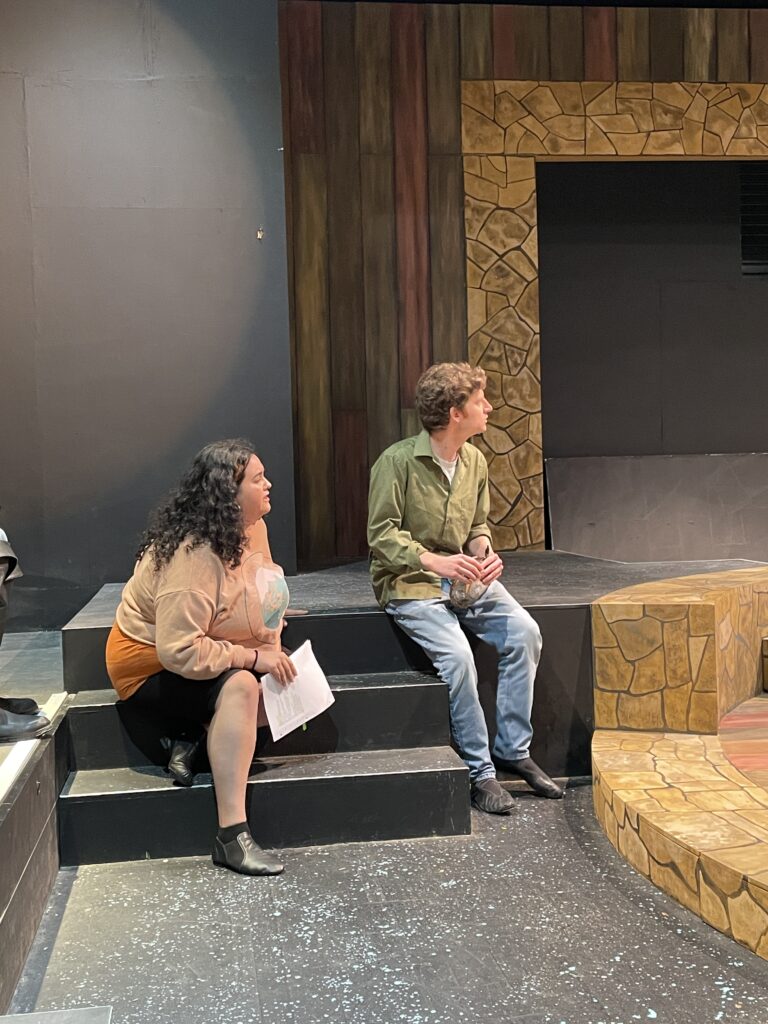
Caylin Bach & Jim Laferriere 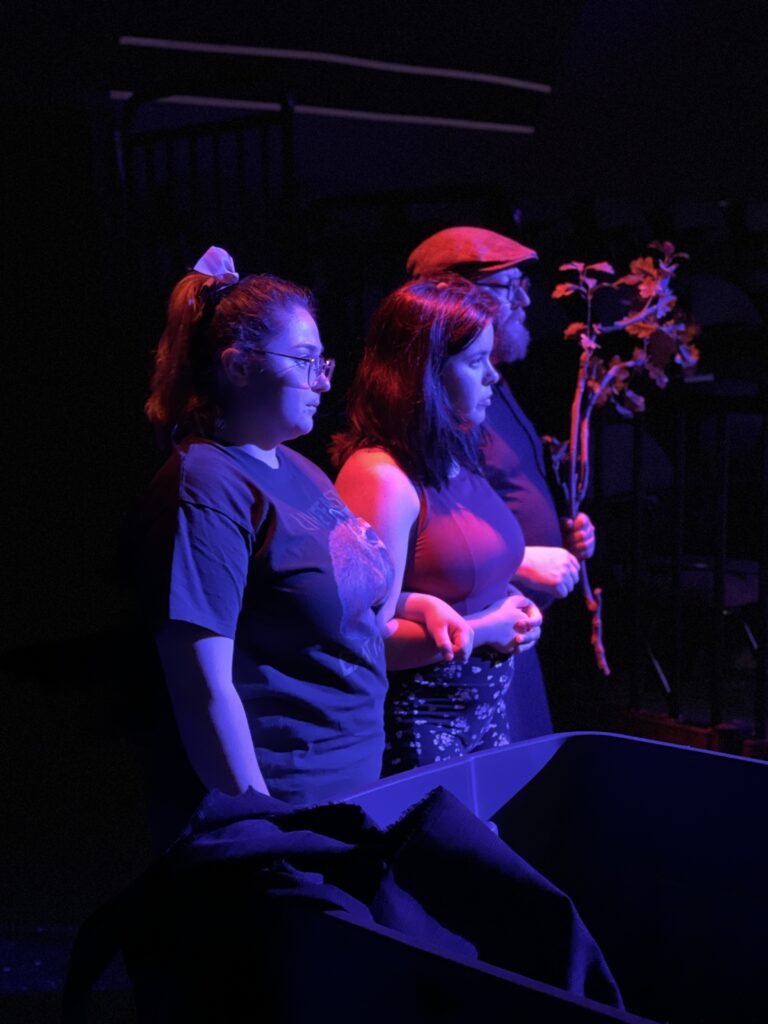
Apparitions My Journey to Macduff
Macbeth opens July 7 and runs through July 23. Tickets available.
by Kathleen Poe
Let me begin by saying that it is always a pleasure to work on Shakespeare. Whether it is the timeless nature of his stories or the delicious taste of his words dripping off my tongue, I have had a lifelong love affair with the Bard.
Specifically, this play. Macbeth.
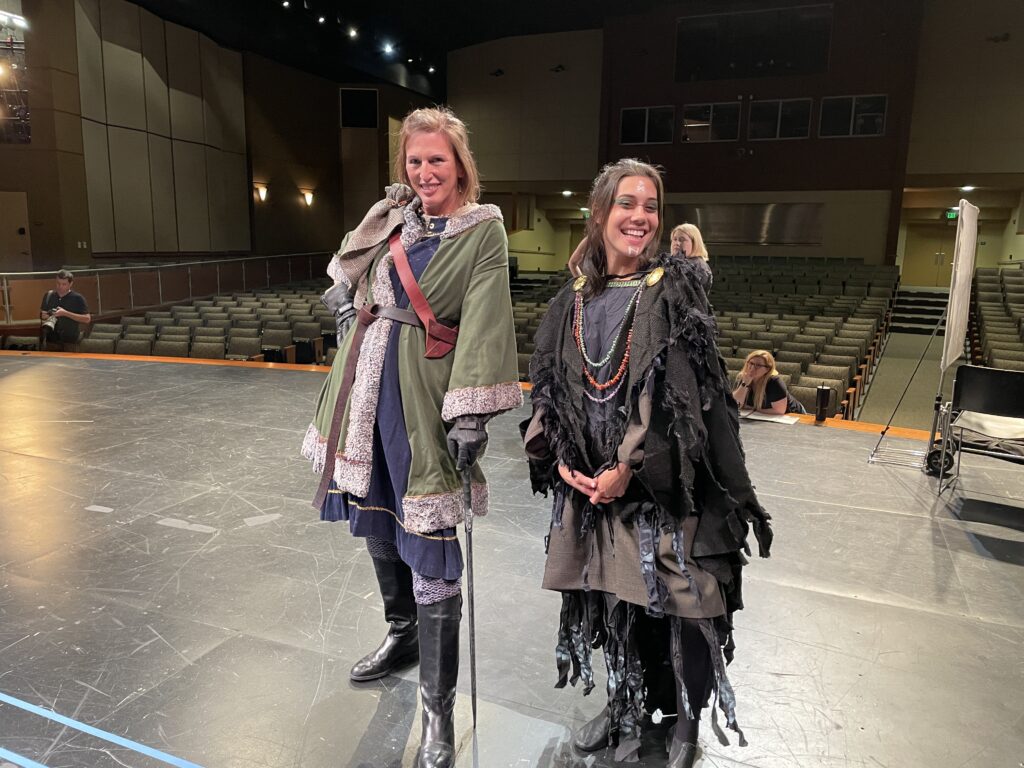
Kathleen Poe as Macduff & Gabriela Llarena as Witch 1 We read it aloud in my 10th-grade English class. I can still remember reading the part of Banquo and falling in desperate love with the story, the characters, the themes, the verse – all of it. We delighted in the Witches and their super-rad (to coin a term from high school) prophecy, we marveled at the wild, audacious ambition of the Macbeths, and we cheered for the miracles of nature that bring the story to its unexpected conclusion.
We laughed at “I am slain”, as you do. To be honest, I’m still laughing at it. The ridiculousness of announcing one’s own death never ceases to send me into a fit of giggles.
(Side note: as I am now a veteran of dying a Shakespearean death, I far prefer, “Thou hast slain me”. It just hits differently.)
I spent my late teenage years obsessed with The Scottish Play. During my junior year, in my English class, we were asked to write a diary of a famous person, and I chose Macbeth. That summer, I spent my babysitting money to go see a production of Macbeth at the Old Globe Theater in San Diego. It was amazing. They performed it in the round, and I was up close and personal. The Witches pounded thick ropes on the stage while giving their prophecies, and one of them ended up in my lap (the ropes, not the Witches). Mac and Lady M swapped an outrageous amount of spit. I was even more enthralled. How could I not be enthralled? I promise it wasn’t because of the spit.
In college, I took a Shakespeare class that only fueled my fire. Not only did I passionately love Macbeth, but now that adoration stretched to King Lear, Henry V, and Richard II (it took longer for me to love Hamlet, to be honest, but now I do, with all my heart).
When I first started doing Shakespeare on the stage, about eleven years ago, I couldn’t believe that I got to speak those words, and actual people would come to see and hear me do it. I also couldn’t get enough. I’ve now done 18 Shakespeare plays. Yes, 18.
Including my favorite – Macbeth.
But, strangely, up to this summer, I’ve never been able to participate in a fully staged, full-scale production of Macbeth.
My first experience was in a staged reading that we performed on Halloween. I read the role of the First Witch, and I couldn’t believe that I got to speak those words – “Double, double, toil and trouble”. That experience kept my Macbeth fire blazing.
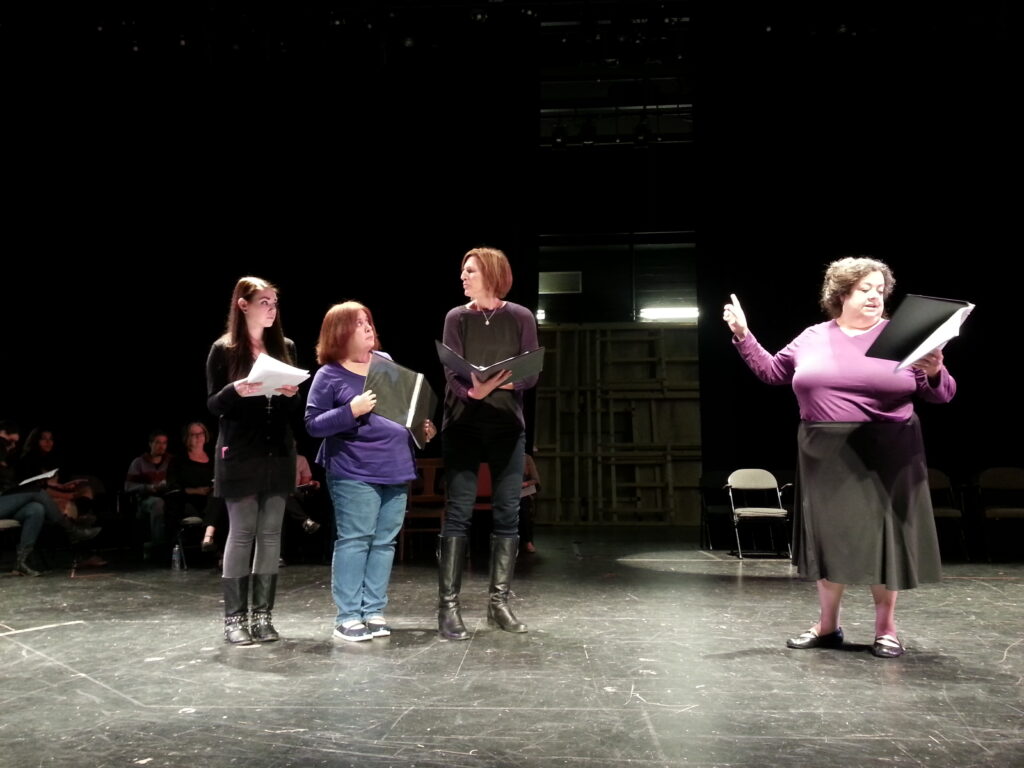
Breanna Reilly, Georgann Wallace, Kathleen Poe & Martha Kight in the staged reading of Macbeth A few years later came two nights as Macduff and the Second Witch, as part of our all-female Wildflower Women’s Ensemble. We performed in a park in midtown, with minimal staging, surrounded by traffic noises, beer bikes, and live, amplified, tonally suspect covers of Beatles tunes blaring from the café across the street. Despite the less-than-ideal circumstances, it was a wonderful experience. I dearly loved playing Macduff and hoped for another chance at the role.
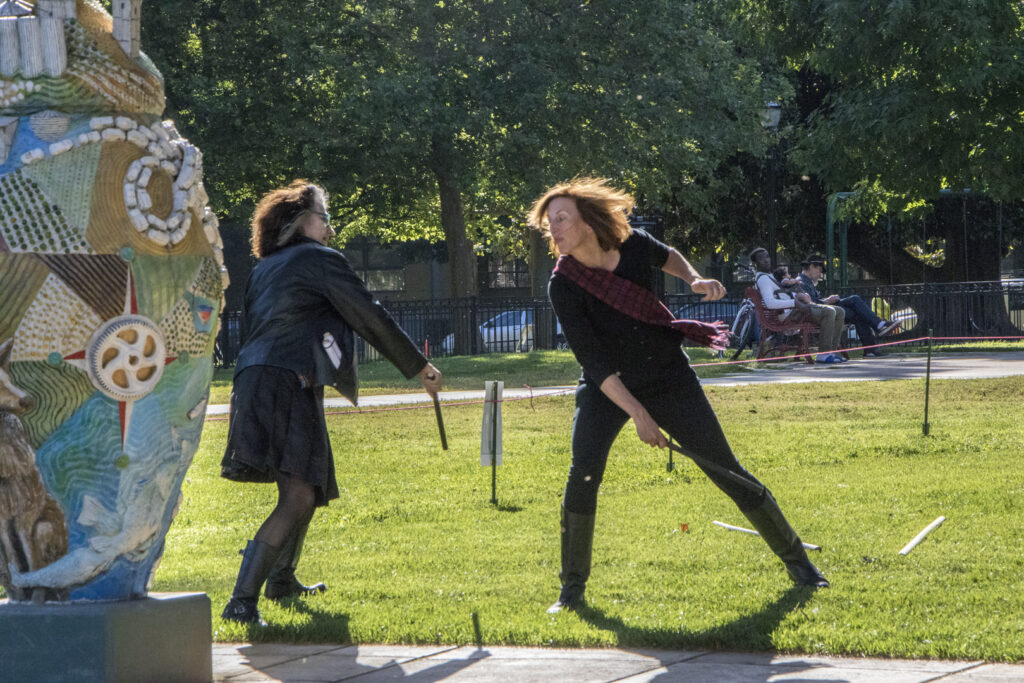
Christine Nicholson as Macbeth & Kathleen Poe as Macduff; 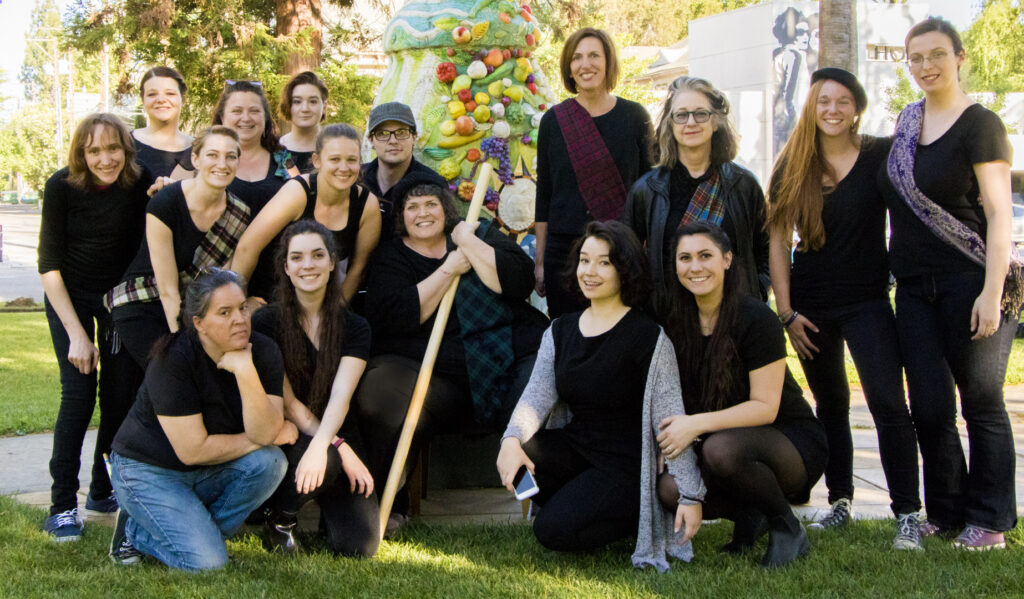
Wildflower Women’s Ensemble cast of Macbeth 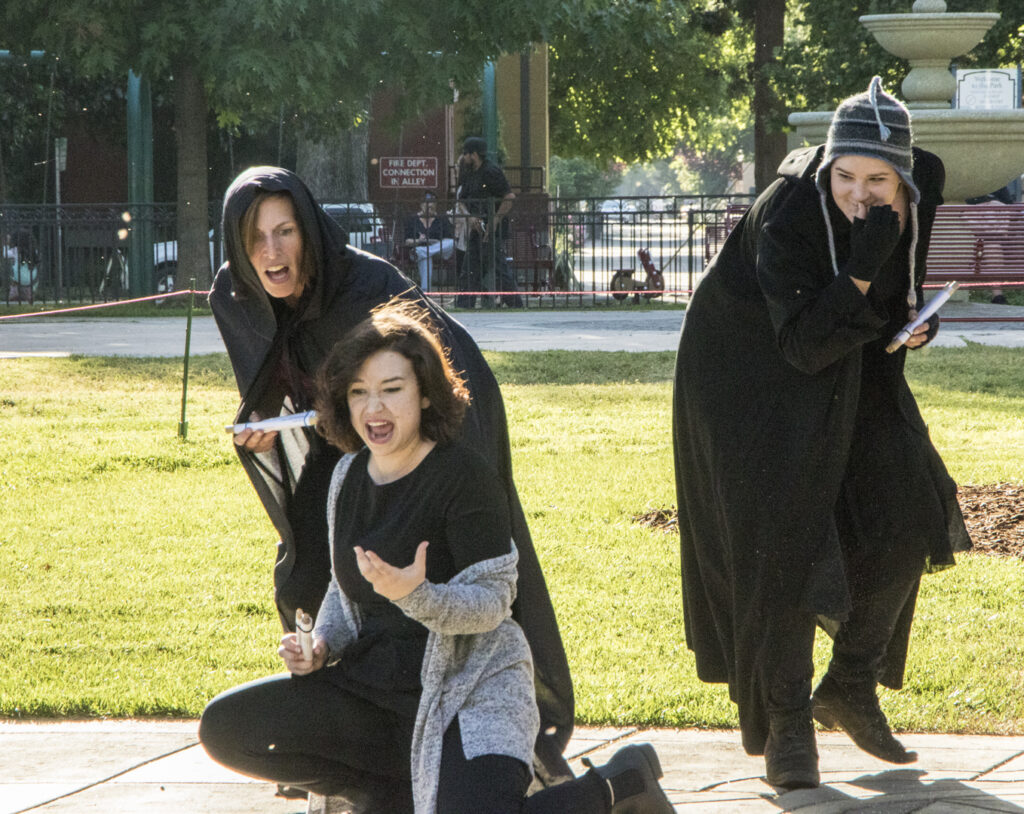
Kathleen Poe as Witch 2, Nina Dramer as Witch 1, Danielle Laroux as Witch 3 I got another crack a few years later, during the pandemic, when we put together an online version of The Scottish Play, complete with online sword choreography. It was an optimistic idea that didn’t quite work, but we gave it a good try. Whatever the case, it kept me in contact with my most cherished of all Shakespeare plays.
And now, here we are – the Sacramento Shakespeare Festival 2023. Macbeth, Macduff, we meet again…
When we first started our tech run-through on Saturday, some of us were dancing around backstage, almost giddy with excitement, as we saw the world that we’ve been working so hard to create begin to take a more complete and vibrant visual form.

Cast of Macbeth 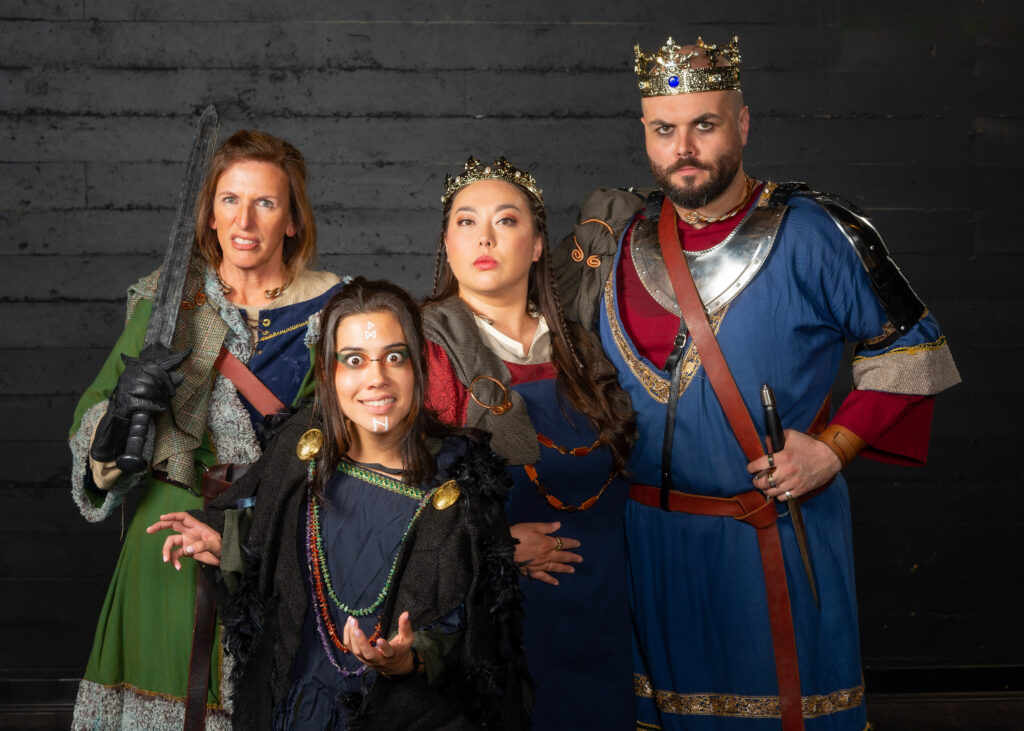
Kathleen Poe as Macduff, Gabriela Llarena as Witch 1, Jackie Martin as Lady Macbeth, Brandon Lancaster as Macbeth 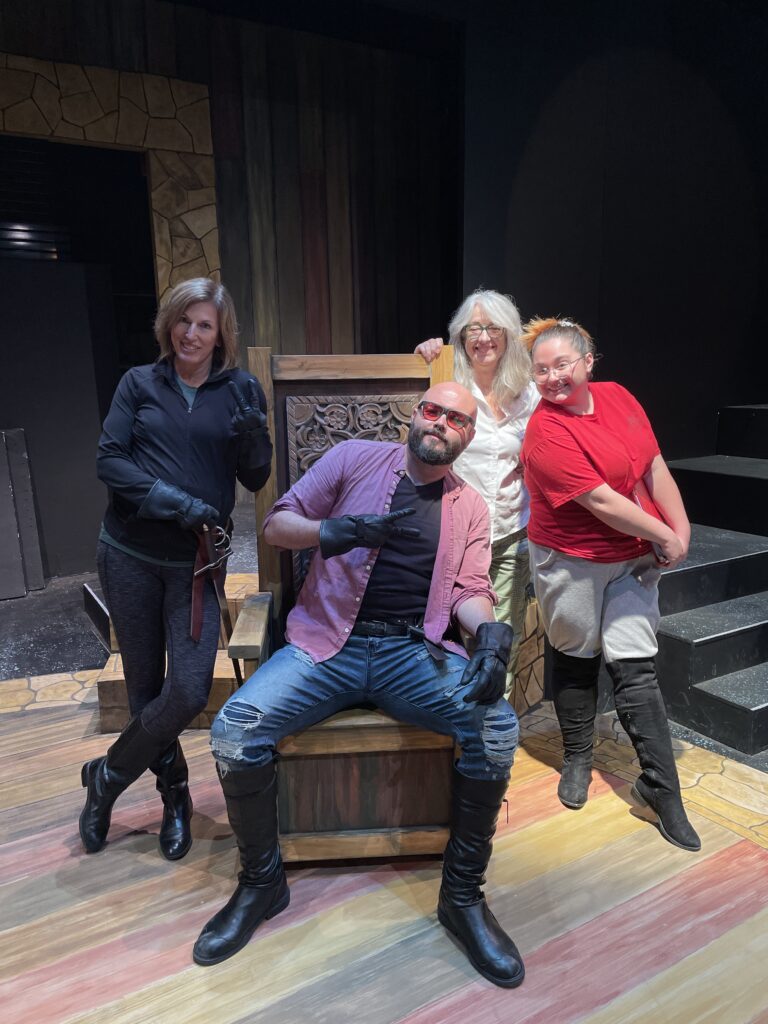
Kathleen Poe, Brandon Lancaster, Christine Nicholson, Petra Tafoya Good grief – the colors are going to be spectacular (and I’m not just talking about the vivid bruises on my arms from sword battles and stage combat)!
I am floored by the talent involved in this project, both offstage and on. It is such a thrill to be a part of it, and to share the stage with such amazing, hard-working actors. How lucky I am.
In a way, this is some intense full-circle stuff for me. It is my lifetime obsession come to fruition.
And I can’t freakin’ wait for everyone to see it.
Eleven hour day – Check!
Macbeth opens July 7 and runs through July 23. Tickets available.
July 1 was our longest day in the rehearsal process. It’s often called the “10 out of 12” day. A day where the technical elements – scenic, lighting, props, sound, and special effects are incorporated into the show. It’s the beginning of tech week and is one of my favorite days.


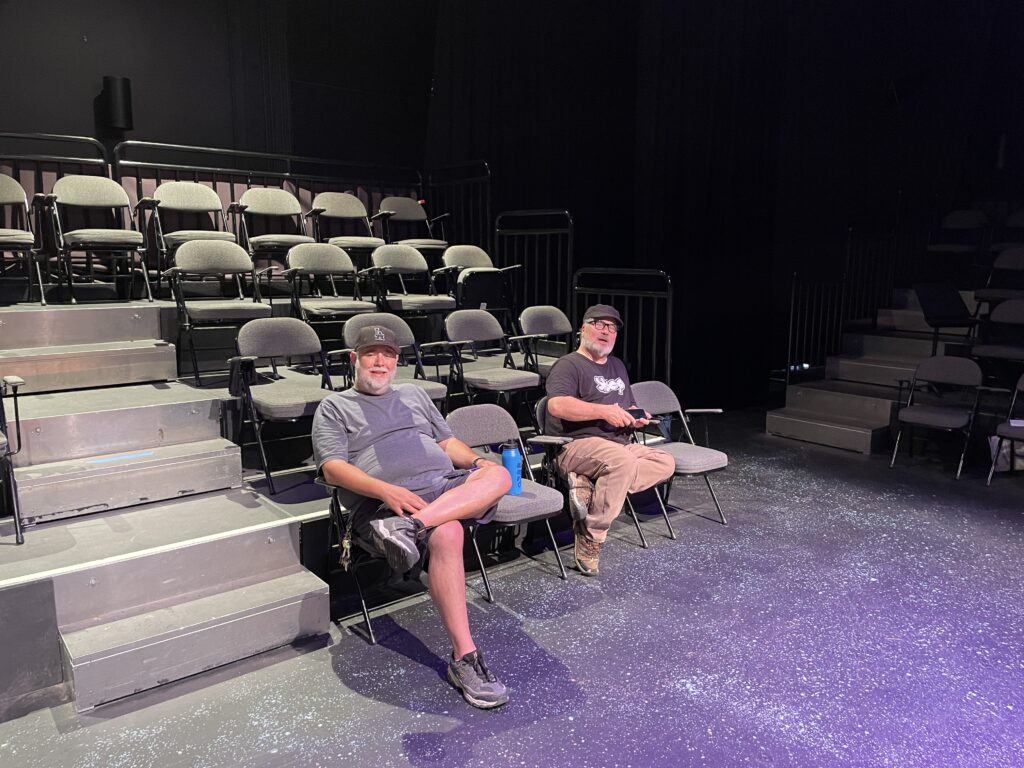
Last week, while watching this brilliant cast do their work during rehearsal, I whispered to my co-director, Christine, “I can’t wait to see this with lights.” And I was not disappointed.
As a lighting designer, there is a lot of magic to be made. The script gives insight, the conversations with the director(s), and the intricate knowledge of how light works can lead to beautiful shows. And then there is this show – our designer, Isaiah Leeper – has been indeed giddy over working with the cast. One of the greatest compliments I’ve heard given to a cast is that he is excited to light them…not just the show, but the actors/characters and the work they are doing which are inspiring more magical moments than anticipated.
Another aspect of this rehearsal process that I’m thrilled to hand over has been some sound design-ish work. Music is very inspirational to me and at least a few times, I’ve based entire show concepts on the feeling I get from one song. When I was directing “After Juliet” in 2013, I had just been introduced to The Punch Brothers and Electric Guest. “The Bait” by EG and “Movement & Location” by The Punch Brothers evoked such imagery for me that I commissioned some original music based on that feeling and decided on a steampunk theme, which tied the whole show together.
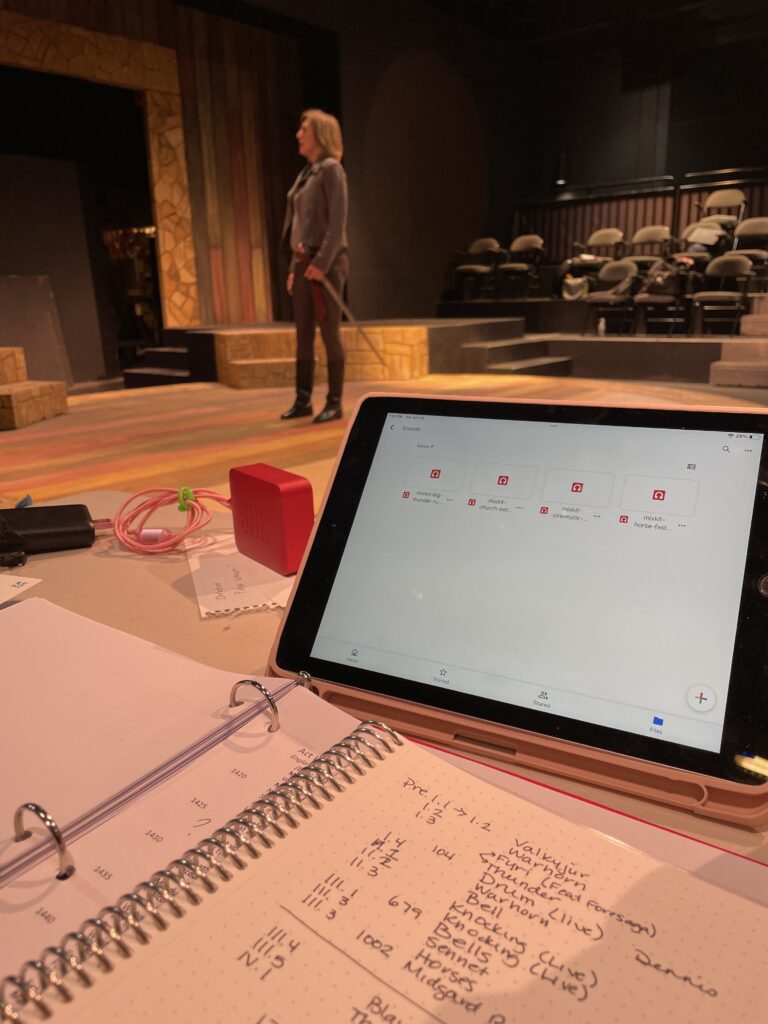
For this show, we have set it in the mid-1200s where the Vikings were being beaten by the Scots after over 400 years. We have incorporated that Viking theme into the show, and the music is a big part. And to truly work with the music for the witch scenes, alarums, and flourishes, we had to get creative. And I’ve been trying to run as much of it as I can, as it was gathered, during rehearsal, I discovered I was missing watching the show as much as I wanted to. As we are co-directing, I knew we were covered, but wanted to do more of my part in the note-taking. So, on Saturday, I got to give over the sound to our sound team, Elijah, Scott, & Gabi and it was remarkable to hear it through the theatre speakers. It’s going to be amazing!
Tech day is over, we made it through the show, and it is going to be stunning! The cast is ready for the next step, which is Monday with first dress. They will dress in their costumes, put on their makeup and do their hair…then just four more days til opening. I hope you’ll join us!
~Lori Ann, co-director, Macbeth














My Make-Up Journey to Witch 1
by Gabriela Llarena
Macbeth opens July 7 and runs through July 23. Tickets available.
Makeup has always been a tool for self-expression and identity. In modern days, makeup is
often viewed in an artistic sense and a skilled artist can entirely transform their face. Within
the theater, makeup is used to enhance the storytelling for two very important reasons:
characterization and clarity over distance. In layman’s terms: the audience needs to know who
you are and what you are expressing from a distance.Theater is the reason I began doing my own makeup and the lockdown of 2020 gave me plenty
of free time to explore. When I got cast as Witch 1 for the show, my mind immediately got
excited at the opportunity to have a creative makeup look! As our show is set during the time
period at the end of the Vikings’ reign in Scotland, makeup is a fundamental support to help drop
the audience into the moment we are playing in. After speaking with our directors, Christine
Nicholson and Lori-Ann Delappe-Grodin, and conferring with our costume designer Nicole
Sivell, I had my parameters within which I could come up with a witch makeup look.
The assignment was this: eyeshadow of earth tones (greens/browns), white lines, and minimal
makeup around the mouth. I asked if I could include runes in the look and was given the green
light.To be accurate to the time period, the look would need to be colors and styles that would have
been prominent near the 1300s. Traditionally makeup has been used as a form of protection
against sunlight. This plays a part in the longstanding popularity of kohl, a dark mineral that lines
the eyes. Along with the practicality makeup provided, it was often used to identify the
individual’s power or strengths as well as to evoke the gods. The three main witches in Macbeth
are magical and powerful in their own right. The three of us cast in these roles (Gabriela
Llarena, McKenna Sennett, Shelby Saumier) dived deep into the mythology surrounding our
characters and brainstormed how the makeup could enhance the storytelling.
When I finally sat in front of the mirror, I let the makeup tell me where it wanted to go. I started
with brown eye shadow in the inner eye area because I wanted to emphasize a deep-set stare
that would contrast nicely against the brightness of my eye. I blended that out to a deep shade
of green. As the witches were not following the standard kohl look, I wanted to still incorporate
the practical usage of makeup at that time. By having a dark green shadow, it mimics the effect
of providing sunlight protection. Underneath the eye, I went in with a brown shadow that would
blend out into the skin. The witches live in the dirt and the forest, constantly getting into
mischief, so this is to further showcase the difference between the witches versus the rest of the
humans in the play. It felt wrong to have the right side disconnected from the left side so I used
a simple line over the nose to bring the look into unity.I ended the look by combining the directors’ desire for white lines with the usage of runes. With
white eyeliner, I drew on 3 runes: gateway, breakthrough, and disruption. Gateway and breakthrough
went on my forehead. I’ve been playing my witch as someone who loves mind games so a large
source of my power comes from my ability to break into other’s minds. The rune for disruption
went below my mouth because it is through the prophecies and spells spoken that the witches
create major disruptions and shifts in the play. When I finished the last rune and looked at the
overall effect, I felt confident and powerful – ready to cause havoc. Each witch will have their
own runes that are unique to their character, so if you want to learn more come out to our show!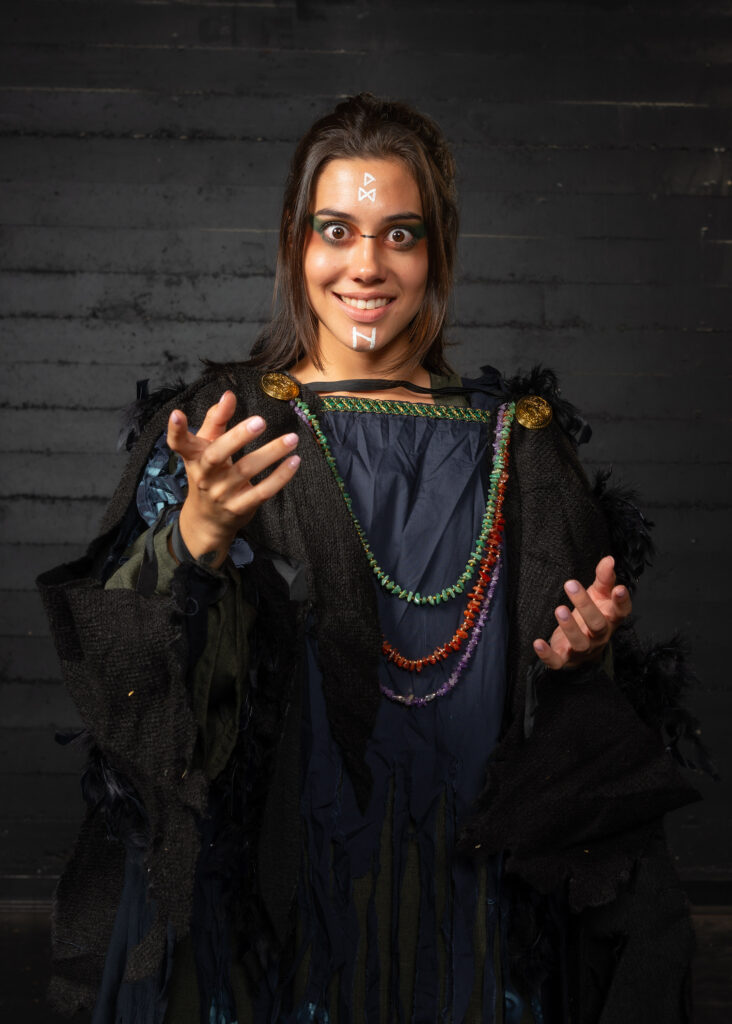
Gabriela Llarena as Witch 1 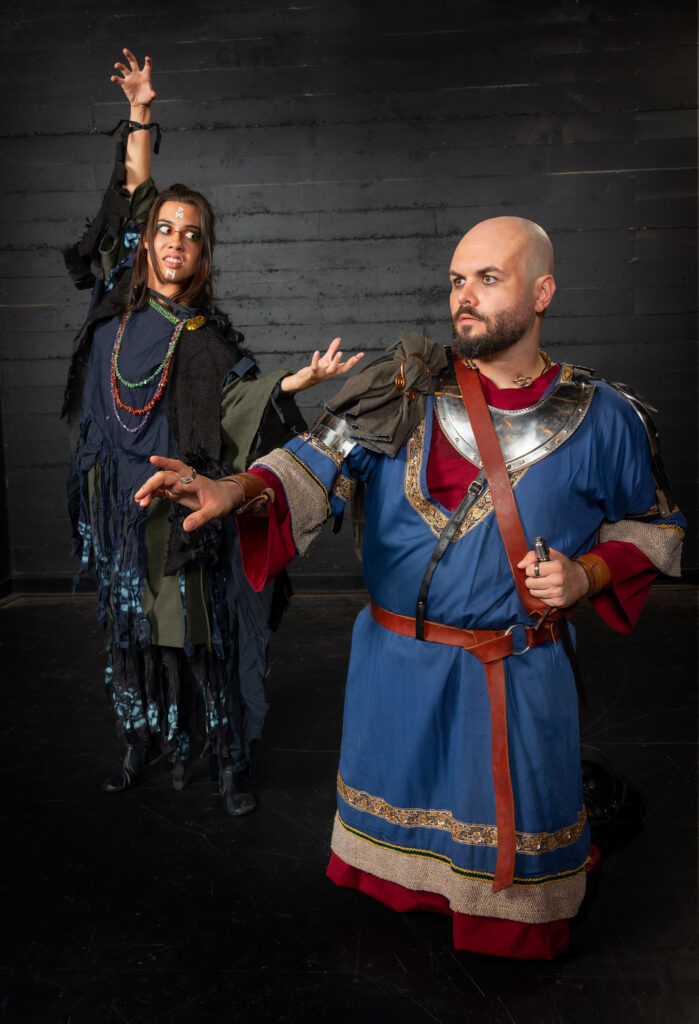
Gabriela Llarena as Witch 1 & Brandon Lancaster as Macbeth 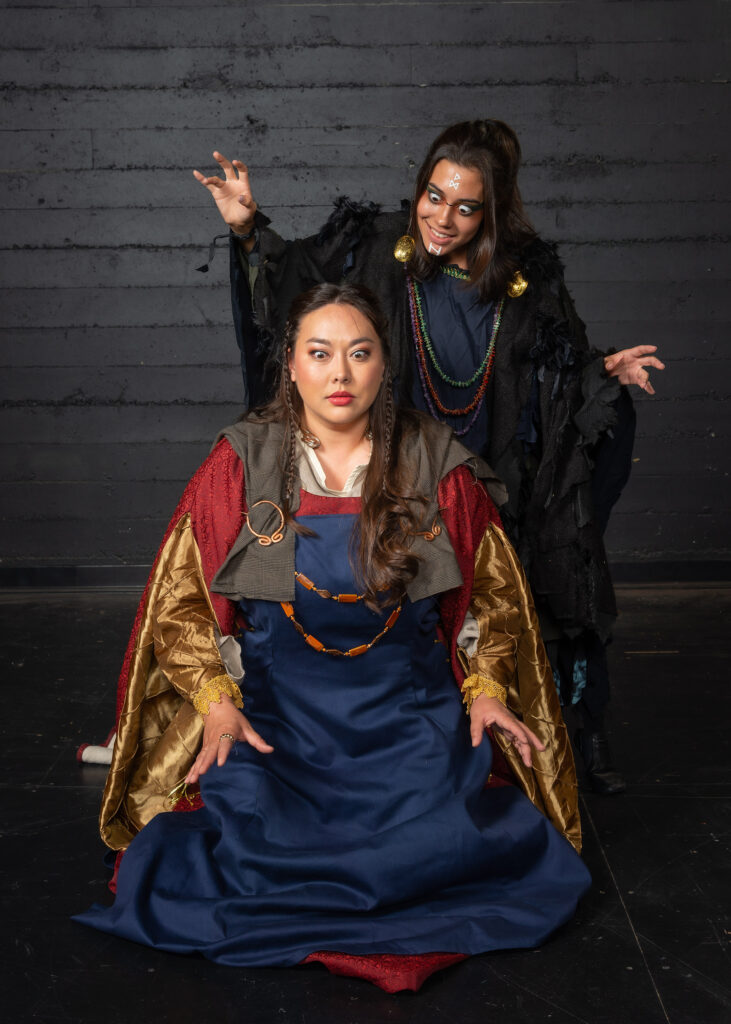
Gabriela Llarena as Witch 1 & Jackie Martin as Lady Macbeth 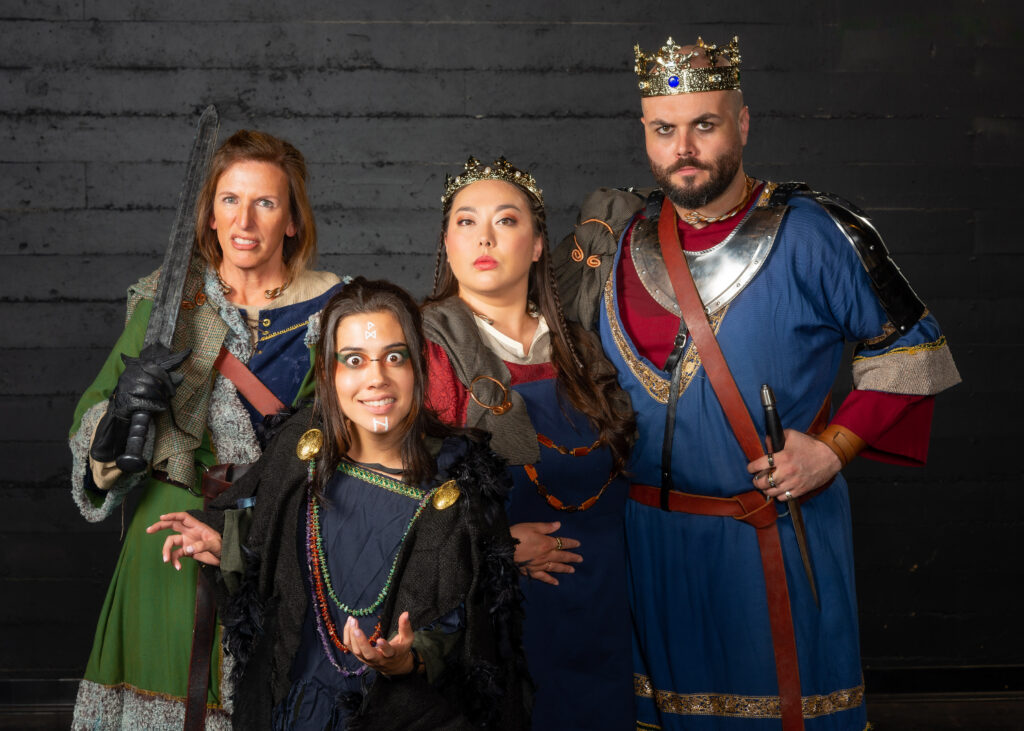
Kathleen Poe as Macduff, Gabriela Llarena as Witch 1, Jackie Martin as Lady Macbeth & Brandon Lancaster as Macbeth The Verse is Yet to Come
We have been working on the verse in Macbeth. Iambic Pentameter. What is that?
An iamb is a metrical foot comprised of an unstressed syllable followed by a stressed syllable. Such as ‘elope’, ’embrace’, or ‘raccoon’. A line of iambic pentameter is simply five of those stuck together. Pretty simple. ‘And if you do it right it sounds like this.’ If you say that sentence out loud, it should sound pretty natural, but you should hear the inherent rhythm.
‘And if you do it right it sounds like this.’
Why? Patterned language, language with a rhythm, has a beat. That beat, that some say imitates the human heart beat, keeps things moving. Like music, it just moves. And in a play, that’s good. But language with a beat can also be manipulated to create special effects within the speech, and create special moments that reflect what is going on in the speech.
Speaking of eloping and embracing, Romeo and Juliet. Probably not raccoons. Perhaps some of the calmest, most harmonious speech is that of Friar Lawrence. He speaks in almost predictable, unbroken, soothing speech, with little punctuation, and thoughts that fill the line.
FRIAR LAWRENCE
Now ere the sun advance his burning eye,
The day to cheer and night’s dank dew to dry,
I must up-fill this osier cage of ours
With baleful weeds and precious-juiced flowers.
Each thought takes a full line, or two. There is no punctuation within a line of verse, and the rhythm is even and predictable. But there’s more! These are rhyming couplets, which means that every two lines rhyme with each other. Even more soothing. Even more predictable.
The point of all this is to give context to some beautiful uses of disjointed, broken, unharmonious language in Macbeth. Speaking of raccoons. Are there raccoons in Macbeth? No, but there should be.
What could you do to a line of iambic pentameter to make it broken, not soothing, not predictable.? Break up the line with punctuation, or, worse, make it separate sentences. And then give those sentences to more than one speaker. What if you had four sentences in one line of iambic pentameter, spoken by two different people on stage, so that the audience actually has to look from one to the other four times in one line? Soothing? Not so much.
When Macbeth comes out of Duncan’s chamber after Duncan is killed, (spoiler alert, sorry), the lines are
MACBETH
I have done the deed. Didst thou not hear a noise?
LADY MACBETH
I heard the owl scream and the crickets cry.
Did not you speak?
MACBETH
When?
LADY MACBETH
Now?
MACBETH
As I descended?
Broken language. Broken harmony. Broken kingdom. Broken king.
When spoken as a single line, by two people, it sounds like
‘Did not you speak? When? Now. As I descended.’
The tension, the energy, the discord created by the rhythm itself, after almost a thousand lines of regular, mostly unbroken lines in the play so far, is palpable. And Shakespeare is telling the actors that this is the way it should be done.
Shakespeare also tells us when to pause. When Macbeth hears the news that Lady Macbeth has died, (another spoiler alert), Shakespeare literally gives him a pause.
SEYTON
The Queen, my lord, is dead.
MACBETH
She should have died hereafter;
There would have been a time for such a word.
After Seyton’s line, there are two iambs missing to complete the line of verse. Shakespeare is telling the actor playing Macbeth to wait exactly that long before he speaks again. And after his next line, there is another iamb and a half missing to give him time to gather himself.
Did Shakespeare really go to all that trouble just to make one of the most brilliant plays we have? Yep. Do actors really go to all that trouble to make it work? We try.





We’re Back…Live and in Person
We had forty actors audition this year, in person, for our festival.
March 17, 2020, 1177 days ago, everything shut down. For a couple of months, there was no theatre, anywhere. Then, sometime in May, I think, everyone, everyone started doing Zoom readings of Shakespeare plays online with their friends for their friends. Everyone. Because they could. Because they refused to not do it. And there were no auditions, really, only friends.
In the fall, people started taking the Zoom thing seriously. Fully produced Zoom plays with memorized lines, maybe, because you couldn’t really tell, for paid tickets on YouTube. You saw your fellow actors when you picked up your green screens, web cameras, and microphones. And then went home and hid in your living for your Zoom performance. For fifteen people in their living rooms.
And then we all did a whole season of Zoom plays. We saw our fellow actors when we brought back the green screens, webcams, and microphones. Some auditions, on Zoom, not many, mostly the people you knew who were as bored as you were. Will you be in our Zoom play?
We had forty actors audition this year, in person.
By the next summer, 2021, 812 days ago now, some people met outside to do Shakespeare, at some social distance, outside, for real cameras that streamed our little performances into 23 homes at a time. We saw our fellow actors, outside only, at a little distance, for the time we were onstage or waiting in the wings. But we did it. Some auditions, on Zoom. Most people we knew.
And that fall, little by little, with a theatre full of cameras, microphones, mixing boards, and cables, we brought in a few friends as an audience, stepping over the cables, feeling like they couldn’t laugh because we were streaming into homes. And then, finally, we started acting with people on the stage for people in the audience. And one play at a time, we crawled back to some kind of normal.
We had forty actors audition this year. We couldn’t even use them all. Come see.






